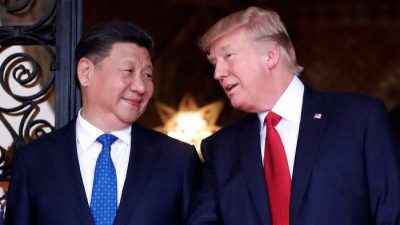
The
United States government has slapped sanctions on 33 Chinese companies
and institutions, putting them on two so-called entity lists as it dials
up the hostility during the lowest point in US-China relations in
decades.
Two
dozen government institutions and Chinese companies, including the
software giant Qihoo 360 Technology, were placed on the first list for
“supporting procurement of items for military end-use in China,” according to a May 22 statement by the US Department of Commerce.
The
Institute of Forensic Science under the Chinese Ministry of Public
Security, and eight companies were added to a second list with
restricted access to US technology because they are “complicit in human
rights violations and abuses … against Uygurs, ethnic Kazakhs, and other
members of Muslim minority groups in the Xinjiang Uygur Autonomous
Region,” according to a second statement by the Commerce Department’s Bureau of Industry and Security (BIS). This second list of nine supplements the bureau’s October 2019 sanctions on 28 entities for the same charge.
“The
new additions to the Entity List demonstrate our commitment to
preventing the use of US commodities and technologies in activities that
undermine our interests,” US Secretary of Commerce Wilbur Ross said in a statement.
The latest sanctions add to the litany of grievances between the two largest economies on earth, as the jostling from
almost two years of the US-China trade war extended into disputes in technology and cybersecurity, access to Wall Street’s capital market and even to the origin of the current coronavirus pandemic.
For
many of these sanctioned firms and institutions, access to US
technology and doing business with US companies are critical in their
operations, and their inclusion in the entity list makes it difficult
for them to receive export licenses for US software and hardware.
Washington’s
latest initiative is likely to anger Beijing at a time when relations
between the world’s two largest economies are already fraught with
tensions over the US-China trade war, and now the anything but certain
Chinese legislation that will outlaw secessionist and subversive
activities as well as foreign interference and terrorism in Hong Kong.
The
US, which has also been widely criticised for its human rights record
especially under President Donald Trump, has until the end of May to
assess whether Hong Kong remains suitably autonomous from China under
the Hong Kong Human Rights and Democracy Act of 2019 – a condition for
extending the city’s preferential trading and investment privileges with
US businesses.
Qihoo
360, based in the Chinese capital, is one of China’s earliest and
largest technology giants, known for its antivirus software and web
browser. The company, first listed in the US in 2011, was taken private
in 2015 and re-listed on the Shanghai Stock Exchange in 2018. Officials at the company could not be reached on a weekend for comments.
Besides
Qihoo 360, the first entity list includes Beijing-based CloudMinds Inc,
which is a developer of cloud-based robots and smart machines. The
company in February shipped its smart robots to the Hubei provincial capital of
Wuhan to help transport supplies, meals and biohazard materials in
hospitals and reduce human contact with potentially contagious material
in the city’s fight to contain the coronavirus.
Other
entities on the list include the Centre for High Pressure Science and
Technology Advanced Research, the Harbin Engineering University, Harbin
Institute of Technology, and the Peace Institute of Multiscale Science.
China’s
treatment of Uygur Muslims is another sore point between Washington and
Beijing. China is accused of massive activities in Xinjiang meant to
eradicate the ethnic and cultural identity of Uygurs and other Muslim
minorities. Beijing has denied the charge, saying the compulsory
programmes at the re-education camps provide training for the Uygurs to
find better jobs and stay away from the influence of radical
fundamentalism.
The
US House of Representatives is also set to vote on a measure approved
by the Senate that will impose sanctions on Chinese officials over the
treatment of the Uygurs. The second list comprises Cloudwalk Technology,
FiberHome Technologies Group and unit Nanjing FiberHome Starrysky
Communication Development, NetPosa and units SenseNets, Intellifusion,
and IS’Vision.
*
Note to readers: please click the share
buttons above or below. Forward this article to your email lists.
Crosspost on your blog site, internet forums. etc.
Before moving to Hong Kong, Cheryl covered the economy in her native Philippines.
The original source of this article is South China Morning Post
Copyright © Cheryl Arcibal, South China Morning Post, 2020













